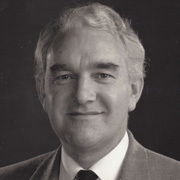
Graeme Wilson
Graeme Wilson began his television career in the mid 1960s. Early that decade he was reporting for Dunedin’s Evening Star while studying English and History part-time at university, when he decided to take some time off to travel overseas. On his return in 1965, Wilson joined fledgling Dunedin channel DNTV-2.
“To start with I was what they called a continuity cameraman,” Wilson says. “You used to sit in a little annex with a camera for the whole night, and my duties included taking off the lens cap at the end of the programme and cueing the continuity announcer, who’d politely introduce the next programme.”
Magazine show Town and Around was just getting underway. Wilson’s journalism background came to the notice of Roy Melford, who was, according to Wilson, “the executive producer of everything down there.” Wilson joined Town and Arounders David Beatson, Rod Cornelius and Hal Weston for a year before heading to Australia, where Allan Martin — later to become Director-General of TV Two — had just started producing news show This Day Tonight for the ABC.
"On the strength of a remark he’d made to me once in Dunedin, I upped stakes and turned up at his office and said ‘when do I start? I got a job as an assistant producer and researcher on This Day Tonight in Melbourne, and became a reporter not long after that.”
During his decade in Australia (most of it spent with the ABC), Wilson moved from reporting to producing. In 1975 he returned to New Zealand, after being recruited by Des Monaghan to produce current affairs programme Seven Days.
“We had Ian Fraser and Ian Johnstone among the reporters, and we did some really good shows," says Wilson. He counts Johnstone’s three-part series on South Africa as one particularly notable achievement.
In mid 1976 Wilson was enticed back to Dunedin, to become one of the original four members of the Natural History Unit (later NHNZ), alongside directors Neil Harraway and Robin Scholes, and cameraman Bob Brown. After helping produce (and narrate) award-winning series Hidden Places, he was called to Avalon, where he was soon put in charge of current affairs and information. “I started Newsmakers with Ian Fraser, Video Dispatch, which I’m very proud of being associated with, Close Up, Foreign Correspondent and some others — all from scratch. It was a memorably good time.”
Then Wilson moved to Auckland, to work under news head Bruce Crossan as Editor of News. “It wasn’t my favourite job,” he says. “I think I was better at documentaries and current affairs.” TVNZ Director-General Julian Mounter was about to give the corporation a bit of shake-up, and named Wilson as Director of Strategic Planning.
“My job was basically to formulate strategies for the business,” he says. “I had a great deal to do with the restructuring, which for one go around was very successful; TVNZ became a really vibrant and vital place.” But he feels the continuing rounds of changes began to pall. “Over a period of years, you get a bit wary of restructuring — it’s not so much shuffling the deck chairs, as much as changing the cushion covers.”
Towards the end of 1997 Wilson was offered what he considers to be his dream job, as Japan-based vice-president of Jupiter Television. “At that time it was a group of five or six TV Channels,” Wilson says. “During the time of my incumbency I helped to grow into something like 22 channels.” He spent five years in the role, and another year doing consultancy for Jupiter’s parent company Liberty Media, who had originally launched Sky in New Zealand and were at the time the biggest cable and satellite company in the world.
“I returned to New Zealand to basically retire.” Wilson says. He subsequently spent some time as chair of the NZ Screen Council, but has had no involvement in broadcasting since 2000.
Profile written by Doug Coutts
Published on 9 October 2018
Sources include
Graeme Wilson
Russell Garbutt, "Its O.K. Leaving Here" - A brief history of the first twenty-five years of television in Dunedin (Dunedin: Television New Zealand, 1988)